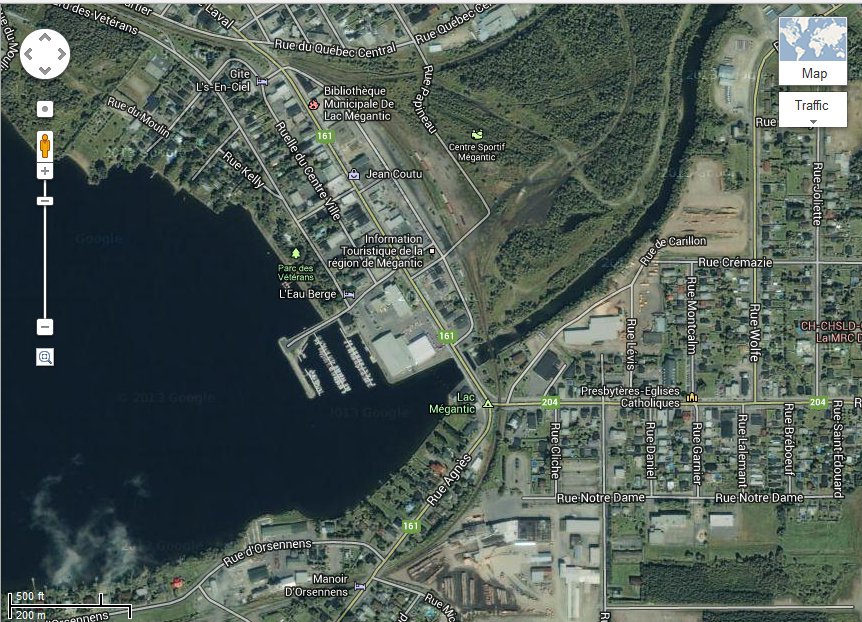The CBC has a report:
A train carrying crude oil derailed overnight in the heart of Lac-Mégantic in Quebec’s Eastern Townships, sparking a major fire that led to the evacuation of 1,000 people from their homes.
Witnesses reported between four and six explosions overnight in the town of about 6,000 people. The derailment happened at about 1 a.m. ET, about 250 kilometres east of Montreal.
It is not yet known if there are any casualties, but several people have been reported missing and are feared dead.
Zeph Kee, who lives about 30 minutes outside of Lac-Mégantic, said he saw a huge fireball coming from the city’s downtown.
Kee said several buildings and homes were completely flattened by the blast.
Google Maps shows the railway line entering town from the southwest and curving along the lakeshore, crossing the Chaudière River:

More than 100 firefighters, some as far away as Sherbrooke, Que., and the United States, were on the scene early Saturday morning to bring the flames under control.
A large but as-yet undetermined amount of fuel is also reported to have spilled into the Chaudière River.
The derailed train belongs to Montreal Maine & Atlantic, which owns more than 800 kilometres of track serving Maine, Vermont, Quebec and New Brunswick, according to the company’s website.
The cause of the derailment is under investigation. A spokesperson for Quebec provincial police said it is still early too early to say what caused it.
Update: Twitchy has collected some Tweets and photos from Lac-Mégantic.
Les citoyens de #LacMegantic ont eu une vision d'horreur cette nuit. #Explosion #RCES pic.twitter.com/A4zyOAc7Yn
— Radio-Canada Estrie (@rc_estrie) July 6, 2013
Le Bureau de la Sécurité des Transports fera enquête #LacMegantic #RCES pic.twitter.com/i2HUcr31kG
— Radio-Canada Estrie (@rc_estrie) July 6, 2013
Another unbelievable shot from #LacMegantic: pic.twitter.com/yhu1Z6sUOx
— Michael Forian (@Forian) July 6, 2013
#déflagration à #LacMégantic : photographie prise à partir de l'hélicoptère de la Sûreté du Québec. pic.twitter.com/9l3sZK6wDj
— Sûreté du Québec (@sureteduquebec) July 6, 2013



